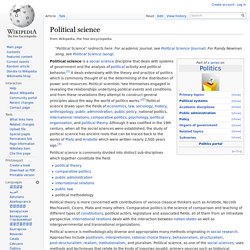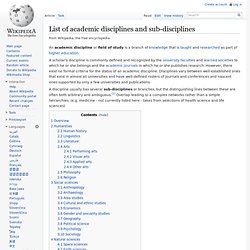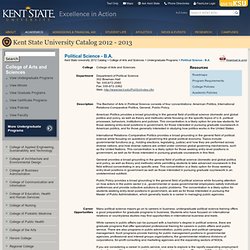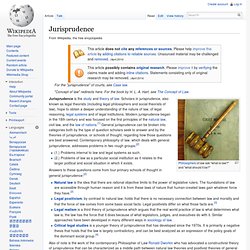

Political science. What is Political Science?

Political science is an academic and research discipline that deals with the theory and practice of politics and the description and analysis of political systems and political behavior. Forensic Science Information Related Career Titles back to the top Related Major Skills Federal Government Job Search Links Federal Government Jobs Federal Job Search Federal Jobs Net FedJobs Government Departments and Agencies Govtjobs.com National Security Agency StudentJobs.gov U.S.
State & Local Government. Political philosophy. Political science. Political science is a social science discipline that deals with systems of government and the analysis of political activity and political behavior.[1] It deals extensively with the theory and practice of politics which is commonly thought of as the determining of the distribution of power and resources.

Political scientists "see themselves engaged in revealing the relationships underlying political events and conditions, and from these revelations they attempt to construct general principles about the way the world of politics works. "[2] Political science draws upon the fields of economics, law, sociology, history, anthropology, public administration, public policy, national politics, international relations, comparative politics, psychology, political organization, and political theory. Political science is commonly divided into distinct sub-disciplines which together constitute the field: §Overview[edit]
List of academic disciplines. An academic discipline or field of study is a branch of knowledge that is taught and researched as part of higher education.

A discipline usually has several sub-disciplines or branches, but the distinguishing lines between these are often both arbitrary and ambiguous.[1] Overlap leading to a complex networks rather than a simple heirarchies. (e.g. medicine - not currently listed here - takes from selections of health science and life sciences) Overview[edit] In the early 20th century, new disciplines such as education and psychology were added. In the 1970s and 1980s, there was an explosion of new disciplines focusing on specific themes, such as media studies, women's studies, and black studies. There is no consensus on how some academic disciplines should be classified (e.g., whether anthropology and linguistics are social sciences disciplines or humanities disciplines).
An asterisk (*) denotes a field whose academic status has been debated among this article's editors. University Catalog: Political Science - B.A. Many political science majors go on to careers in business; undergraduate political science training offers a good preparation for graduate programs in business.

Students who have focused on international relations or country/area studies may find opportunities in international business and trade. While careers in public affairs can be pursued with a bachelor’s degree in political science, there are graduate programs that offer specialized professional training for careers in public affairs and public service. There are also programs in public administration, public policy and political campaign management. Such programs provide training for public management positions in governmental agencies, professional and interest groups organizations, the governmental relations divisions of corporations, for-profit consulting and marketing agencies and the expanding sectors of NGOs. Department of Political Science: Tufts University. There are four (4) subfields of political science: American Politics; Comparative Politics International Relations; and Political Theory and Philosophy.
Political Science majors are required to take at least one course in each of these subfields. Below are the learning objectives for courses in each of the four subfields. Jurisprudence. Philosophers of law ask "what is law?

" and "what should it be? " Jurisprudence is the study and theory of law. Scholars in jurisprudence, also known as legal theorists (including legal philosophers and social theorists of law), hope to obtain a deeper understanding of the nature of law, of legal reasoning, legal systems and of legal institutions. Modern jurisprudence began in the 18th century and was focused on the first principles of the natural law, civil law, and the law of nations.[1] General jurisprudence can be broken into categories both by the type of question scholars seek to answer and by the theories of jurisprudence, or schools of thought, regarding how those questions are best answered.
Contemporary philosophy of law, which deals with general jurisprudence, addresses problems in two rough groups:[2] (1.) Civil procedure. Differences between civil and criminal procedure[edit] In jurisdictions based on English common-law systems, the party bringing a criminal charge (in most cases, the state) is called the "prosecution", but the party bringing most forms of civil action is the "plaintiff" or "claimant". In both kinds of action the other party is known as the "defendant". A criminal case against a person called Ms. Sanchez would be described as “The People v. (="versus", "against" or "and") Sanchez,” "The State (or Commonwealth) v.
Most countries make a clear distinction between civil and criminal procedure. Evidence from a criminal trial is generally admissible as evidence in a civil action about the same matter. The standards of proof are higher in a criminal case than in a civil one, since the state does not wish to risk punishing an innocent person. Constitutional law. State and legal structure[edit] Constitutional laws may often be considered second order rulemaking or rules about making rules to exercise power. It governs the relationships between the judiciary, the legislature and the executive with the bodies under its authority. One of the key tasks of constitutions within this context is to indicate hierarchies and relationships of power. For example, in a unitary state, the constitution will vest ultimate authority in one central administration and legislature, and judiciary, though there is often a delegation of power or authority to local or municipal authorities.
When a constitution establishes a federal state, it will identify the several levels of government coexisting with exclusive or shared areas of jurisdiction over lawmaking, application and enforcement. Human rights[edit] Public policy. Other scholars define it as a system of "courses of action, regulatory measures, laws, and funding priorities concerning a given topic promulgated by a governmental entity or its representatives.